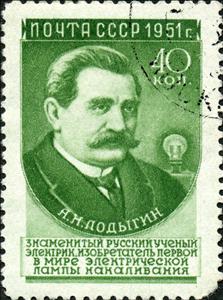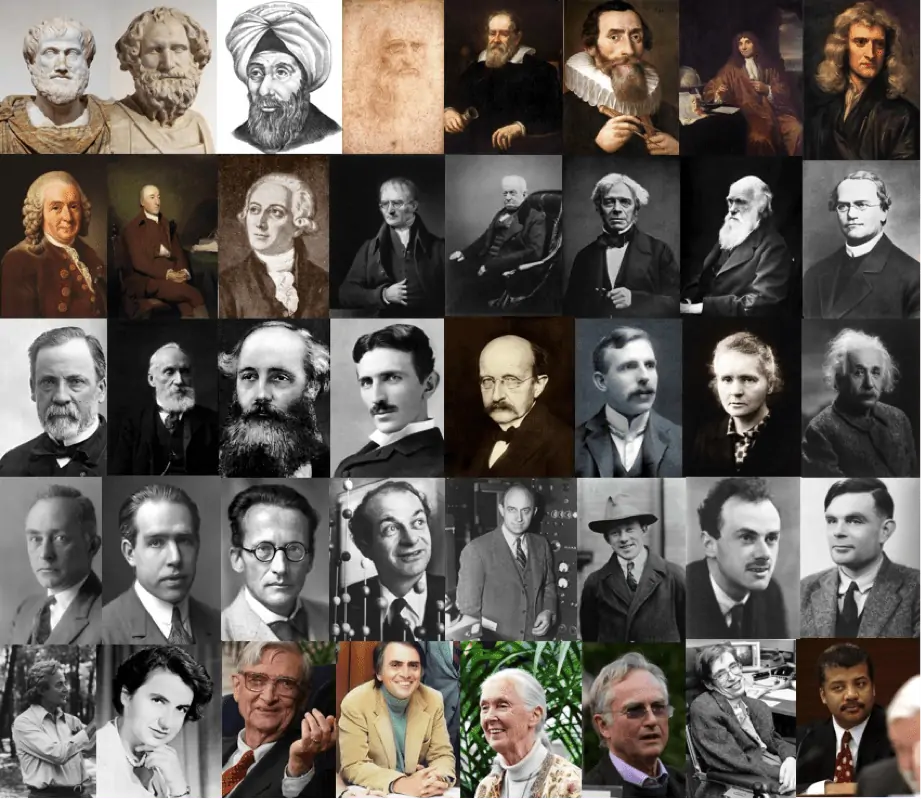Stamp: Alexander N. Lodygin (1847-1923), Russian inventor (Soviet Union, USSR 1951)
Alexander N. Lodygin (1847-1923), Russian inventor (Soviet Union, USSR 1951)
15 August (Soviet Union, USSR ) within release Famous scientists goes into circulation Stamp Alexander N. Lodygin (1847-1923), Russian inventor face value 40 Russian kopek
| Stamp Alexander N. Lodygin (1847-1923), Russian inventor in catalogues | |
|---|---|
| Michel: | Mi:SU 1580 |
Stamp is vertical format.
Also in the issue Famous scientists:
- Stamp - Pyotr K. Kozlov (1863-1935), Russian traveler and explorer face value 40;
- Stamp - Alexander M. Butlerov (1828-1886), Russian chemist face value 40;
- Stamp - Stepan P. Krasheninnikov (1711-1755), Russian geographer face value 40;
- Stamp - Nikolay I. Lobachevsky (1792-1856), Russian mathematician face value 40;
- Stamp - Nicholay N. Miklouho-Maclay (1846–1888), Russian explorer face value 40;
- Stamp - Aleksandr G. Stoletov (1839-1896), Russian physicist face value 40;
- Stamp - Alexey N. Severtsov (1866-1936), Russian biologist face value 40;
- Stamp - Nikolay S. Kurnakov (1860-1941), Russian chemist face value 40;
- Stamp - Pyotr P. Lebedev (1866-1912), Russian physicist face value 40;
- Stamp - Alexander N. Lodygin (1847-1923), Russian inventor face value 40;
- Stamp - Dmitry I. Mendeleyev (1834-1907), Russian chemist face value 40;
- Stamp - Kliment A. Timiryazev (1843-1920), Russian biologist face value 40;
- Stamp - Konstantin E. Tsiolkovsky (1857-1935), Russian scientist face value 40;
- Stamp - Sofia V. Kovalevskaya (1850-1891), Russian mathematician face value 40;
- Stamp - Alexander O. Kovalevsky (1840-1901), Russian biologist face value 40;
- Stamp - Pavel N. Yablochkov (1847-1894), Russian inventor face value 40;
- Stamp - Alexander O. Kovalevsky (1840-1901), Russian biologist face value 40;
Stamp Alexander N. Lodygin (1847-1923), Russian inventor it reflects the thematic directions:
Famous People refers to the fame and public attention accorded by the mass media to individuals or groups or, occasionally, animals, but is usually applied to the persons or groups of people (celebrity couples, families, etc.) themselves who receive such a status of fame and attention. Celebrity status is often associated with wealth (commonly referred to as fame and fortune), while fame often provides opportunities to make money.
An invention is a unique or novel device, method, composition, idea, or process. An invention may be an improvement upon a machine, product, or process for increasing efficiency or lowering cost. It may also be an entirely new concept. If an idea is unique enough either as a stand-alone invention or as a significant improvement over the work of others, it can be patented. A patent, if granted, gives the inventor a proprietary interest in the patent over a specific period of time, which can be licensed for financial gain.
Engineers, as practitioners of engineering, are professionals who invent, design, analyze, build and test machines, complex systems, structures, gadgets and materials to fulfill functional objectives and requirements while considering the limitations imposed by practicality, regulation, safety and cost.The word engineer (Latin ingeniator, the origin of the Ir. in the title of engineer in countries like Belgium and The Netherlands) is derived from the Latin words ingeniare ("to contrive, devise") and ingenium ("cleverness"). The foundational qualifications of a licensed professional engineer typically include a four-year bachelor's degree in an engineering discipline, or in some jurisdictions, a master's degree in an engineering discipline plus four to six years of peer-reviewed professional practice (culminating in a project report or thesis) and passage of engineering board examinations.
A scientist is a person who researches to advance knowledge in an area of the natural sciences
Electricity is the set of physical phenomena associated with the presence and motion of matter possessing an electric charge. Electricity is related to magnetism, both being part of the phenomenon of electromagnetism, as described by Maxwell's equations. Common phenomena are related to electricity, including lightning, static electricity, electric heating, electric discharges and many others.
Technology is the application of conceptual knowledge to achieve practical goals, especially in a reproducible way. The word technology can also mean the products resulting from such efforts,including both tangible tools such as utensils or machines, and intangible ones such as software. Technology plays a critical role in science, engineering, and everyday life.





